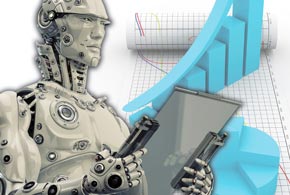
Why Machines Will Emerge as Top Collaborators
 Why Machines Will Emerge as Top Collaborators
Why Machines Will Emerge as Top Collaborators
By viewing cognitive systems more as collaborators than threats, IT execs feel better prepared for anticipated skills gaps among both managers and employees.
 Wise Counsel
Wise Counsel
87% of surveyed managers say they would trust the advice of intelligent systems in making business decisions in the future.
 Fully Accountable
Fully Accountable
88% say they would accept responsibility for an intelligent system’s actions in the same way as they do with the actions of subordinates/co-workers.
 Welcomed Observation
Welcomed Observation
84% say they are comfortable with an intelligent system monitoring and evaluating their work.
 Educated Response
Educated Response
84% say they are fine with an intelligent system observing and learning from their work, and then applying the knowledge in other settings.
 Acceptable Trade-Off
Acceptable Trade-Off
77% say they’d be willing to give up some degree of privacy to benefit from the productivity and insights of intelligent systems.
 Dual Functions
Dual Functions
61% believe that cognitive computing will most impact the way they coordinate and control work and resources, while 26% say it will most affect the ability to solve problems and collaborate.
 Trustworthy Qualities, Part I
Trustworthy Qualities, Part I
61% say they would trust cognitive computing system advice if they understood how the system works and generates advice, and 57% say they’d trust such a system if it had a proven track record.
 Trustworthy Qualities, Part II
Trustworthy Qualities, Part II
51% say they would have faith in a cognitive computing system if it provided convincing explanations, while 33% say they would if “people I trust” use the system.
 Out-of-Step
Out-of-Step
57% express uncertainty as to whether their skills will be sufficient enough to succeed in their role five years from now.
 Top Skills Required Five Years from Now
Top Skills Required Five Years from Now
Digital/tech skills: 42%, Creative thinking and experimentation: 33%, Data analysis and interpretation: 31%, Strategy development: 30%